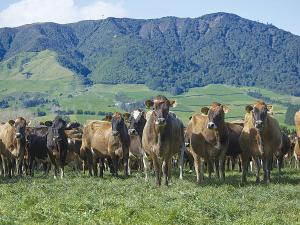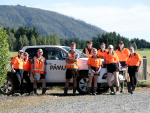New Zealand farmers could have access to low methane elite genetics by 2026.
Herd improvement company LIC says this would have the potential to make a real difference to farmers by helping to ensure emissions reductions don't come at the cost of reducing milk production. The farmer-owned co-op has been working with partners to breed a low methane cow.
In its sustainability report for year ending May 31, released last week, the co-op says its methane research programme, in collaboration with CRV and Pāmu (formerly Landcorp) and with funding from the NZ Agricultural Greenhouse Gas Research Centre (NZAGRC), is progressing well.
"We continue to investigate the link between methane emissions from bulls and their offspring, with the intention of breeding more climate-friendly cows that produce less methane," it says.
The programme is now in its fourth year.
"We initially found that a bull's genetics do play a role in how much methane they emit. The lowest bulls in the trial emitted around 15-20% less methane than the average, after accounting for food eaten.
"Last year, these bulls were mated with heifers from Pāmu farms and we are now testing the methane emissions from these offspring to ensure the genetic variation is representative of their fathers, and will report on these results in the coming year.
Read More
"We hope to produce a methane breeding value and give dairy farmers the opportunity to access low methane elite genetics by 2026. This has the potential to make a real difference to farmers by helping to ensure emissions reductions don't come at the cost of reducing milk production."
LIC says it's always looking at how to innovate and provide farmers with a range of products to help them solve climate change challenges.
"The successful programmes we have built with our partners are enabling us to make significant progress towards achieving our commitment to help farmers reduce emissions on farm."
LIC is also developing a genetic solution for heat tolerance, aiming to provide New Zealand farmers with high genetic merit dairy cows with improved heat tolerance.
Heat stress has significant welfare implications for animals. For dairy cows it can also impact feed intake, milk production, fertility and calf birth weight. LIC says introducing the 'slick' gene into the country's dairy herd could allow for a significant improvement in dairy cow performance in hotter temperatures over the long term.
"We have completed a climate-controlled study on calves, which was a follow-on from a pilot trial conducted last year to to test the response to cold stress. This trial had positive results, showing no significant difference in response to colder conditions between slick calves and non-slick calves."
LIC chair Corrigan Sowman notes that the dairy sector needs to continue to evolve - for climate change and because of it - and therefore the production efficiency of the national herd has never been more important.
Sowman says efficient cows produce more milksolids/kg of feed eaten, have a fertility advantage and have a lower emissions footprint per kilograme of milksolids.
"Farmers consistently using our genetics are breeding genetically superior animals, and at a faster rate. In fact, long-term users of LIC genetics have continued to double the rate of genetic gain in their herds over the last ten years. These gains are cumulative and permanent, delivering long-term benefits into the future."











